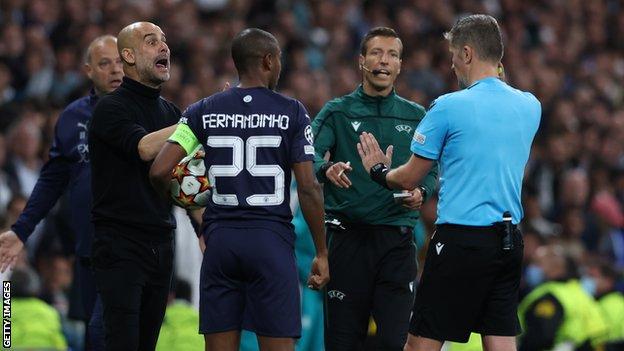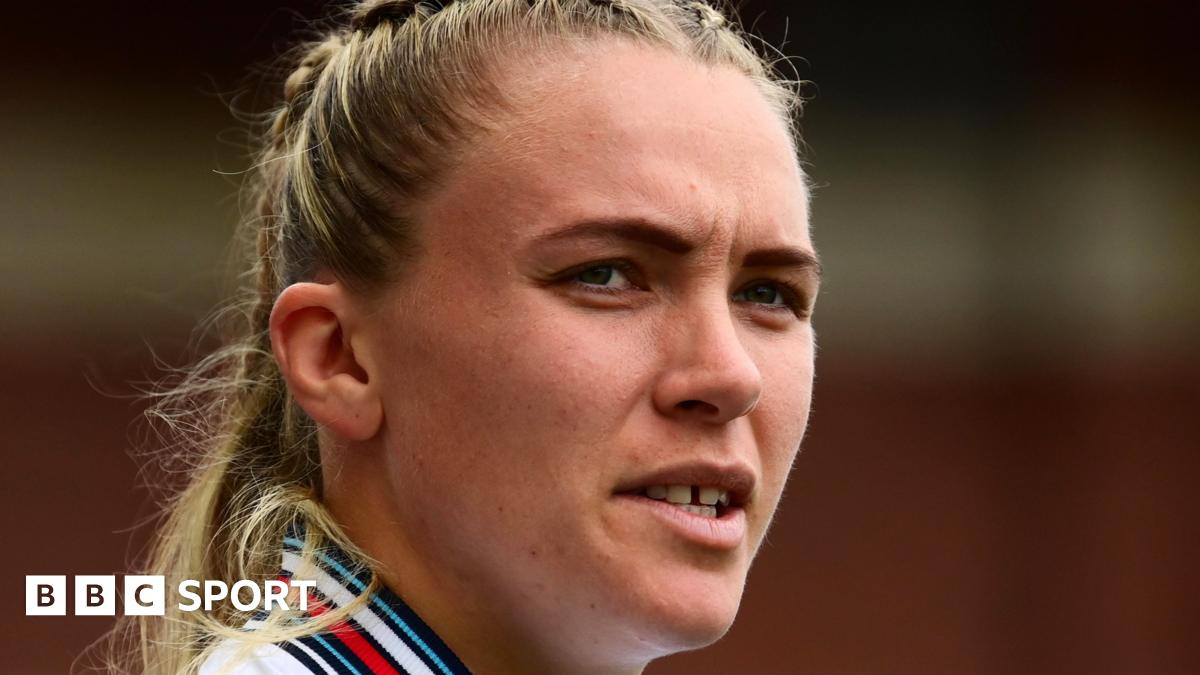ARTICLE AD BOX
 Referee Daniele Orsato added three minutes on at the end of extra-time in Real Madrid's win over Manchester City - but blew his whistle with 10 seconds remaining
Referee Daniele Orsato added three minutes on at the end of extra-time in Real Madrid's win over Manchester City - but blew his whistle with 10 seconds remainingReal Madrid's comeback win over Manchester City was one of the most dramatic games in Champions League history - but it was not without controversy.
Having forced extra-time with Rodrygo's stunning late double before edging ahead in the tie through Karim Benzema's penalty, Real did what most teams would do: they ran down the clock with a masterful exhibition of game management.
However, referee Daniele Orsato had added just three minutes to the second period of extra time, and then blew his whistle with 10 seconds remaining, just when City keeper Ederson was about to boot the ball up the pitch.
While some have eulogised Real after another stunning fightback, others have used the latter stages of the game to debate the rules around the ball being in play.
Writing in the Daily Mail, former referee Mark Clattenburg suggested football introducing 60-minute matches with a stop-clock to eradicate gamesmanship.
Other sports like basketball and American football use a stop-clock, and it's a straightforward concept: essentially, the clock is stopped whenever the ball is not in play, for incidents including injuries, substitutions and the referee dishing out cautions.
Football's law-making body the International Football Association Board (Ifab) has previously looked into the possibility of introducing a stop-clock.
In this season's Premier League, the average 'ball in play' time is 55 minutes and three seconds - the lowest it has been in over a decade.
BBC Sport - using Opta data - looks at some of the ball in play stats to see how each team performs.
Ball in play season by season
This season's ball in play average is the lowest the Premier League has seen since 2010-11.
It's down one minute and 19 seconds from last season, and a minute 40 seconds on the 2013-14 campaign's average.
But there has been less than an hour's play for as long as Opta has been collecting the data.
| Season | Minutes | Seconds |
| 2006-07 | 53 | 28 |
| 2007-08 | 53 | 48 |
| 2008-09 | 54 | 33 |
| 2009-10 | 53 | 25 |
| 2010-11 | 54 | 16 |
| 2011-12 | 55 | 53 |
| 2012-13 | 56 | 23 |
| 2013-14 | 56 | 43 |
| 2014-15 | 56 | 22 |
| 2015-16 | 56 | 1 |
| 2016-17 | 55 | 51 |
| 2017-18 | 56 | 11 |
| 2018-19 | 55 | 31 |
| 2019-20 | 55 | 49 |
| 2020-21 | 56 | 22 |
| 2021-22 | 55 | 3 |
But how about each team in the Premier League?
It will hardly be a surprise to learn that the league's best teams have the ball in play more than those who are fighting for their lives at the bottom of the table.
Norwich are something of an outlier, however, placing 11th for 'ball in play' despite having propped up the Premier League table for much of this season.
How much play are you seeing in your club's matches?
| Team | Minutes | Seconds |
| Manchester City | 60 | 53 |
| Tottenham Hotspur | 57 | 2 |
| Liverpool | 57 | 0 |
| Chelsea | 56 | 39 |
| Manchester United | 56 | 26 |
| West Ham | 56 | 19 |
| Wolves | 56 | 9 |
| Arsenal | 56 | 1 |
| Brighton | 55 | 47 |
| Leicester | 55 | 21 |
| Norwich | 54 | 48 |
| Crystal Palace | 54 | 24 |
| Watford | 53 | 49 |
| Everton | 53 | 28 |
| Brentford | 53 | 10 |
| Newcastle | 52 | 58 |
| Leeds | 52 | 53 |
| Burnley | 52 | 47 |
| Southampton | 52 | 42 |
| Aston Villa | 52 | 23 |
As seen below, a lot of the same teams pop up in this season's Premier League fixtures with the lowest ball in play time, with Aston Villa, Newcastle and Everton all appearing four times in the table above.
| Date | Home | Away | Minutes | Seconds |
| 03/10/21 | West Ham | Brentford | 41 | 33 |
| 21/08/21 | Aston Villa | Newcastle | 41 | 51 |
| 13/02/22 | Newcastle | Aston Villa | 43 | 6 |
| 28/11/21 | Leicester | Watford | 43 | 31 |
| 4/12/21 | Southampton | Brighton | 43 | 33 |
| 22/01/22 | Everton | Aston Villa | 43 | 51 |
| 06/04/22 | Burnley | Everton | 44 | 13 |
| 18/09/21 | Aston Villa | Everton | 44 | 43 |
| 25/09/21 | Watford | Newcastle | 44 | 48 |
| 08/02/22 | Newcastle | Everton | 45 | 16 |
The Pulis pinnacle - games with least ball in play time
The game with the lowest time in play this season - West Ham v Brentford with 41 minutes, 33 seconds - is someway short of Stoke v Blackburn from February 2010, though.
That game - which Stoke won 3-0 in Tony Pulis' 300th game in charge - saw the ball in play for just 39 minutes and one second, 58 seconds fewer than the next game on the list.
The ball being out of play was a common theme in games featuring Stoke. The table below has four of their home matches.
| Date | Home | Away | Minutes | Seconds |
| 06/02/10 | Stoke | Blackburn | 39 | 1 |
| 23/02/08 | Wigan | Derby | 39 | 59 |
| 19/11/11 | Stoke | QPR | 40 | 41 |
| 21/12/13 | Stoke | Aston Villa | 40 | 50 |
| 11/07/20 | Watford | Newcastle | 41 | 32 |
| 03/10/21 | West Ham | Brentford | 41 | 33 |
| 21/08/21 | Aston Villa | Newcastle | 41 | 51 |
| 30/09/18 | Cardiff | Burnley | 42 | 02 |
| 31/01/18 | Stoke | Watford | 42 | 08 |
| 18/04/09 | Sunderland | Hull | 42 | 17 |
The highest was Manchester United's 1-0 home win over Fulham in March 2012 with a whopping 71 minutes and 51 seconds.
That's over half an hour more than Stoke-Blackburn, so you can see how the ball in play times can vary wildly.
| Date | Home | Away | Minutes | Seconds |
| 26/03/12 | Manchester United | Fulham | 71 | 51 |
| 19/11/11 | Swansea | Manchester United | 69 | 53 |
| 28/04/18 | Swansea | Chelsea | 69 | 45 |
| 03/02/21 | Burnley | Manchester City | 69 | 29 |
| 15/05/21 | Brighton | West Ham | 69 | 26 |
| 02/01/20 | Liverpool | Sheffield United | 69 | 23 |
| 04/03/18 | Manchester City | Chelsea | 68 | 21 |
| 11/05/15 | Arsenal | Swansea | 68 | 14 |
| 11/01/20 | Tottenham | Liverpool | 68 | 14 |
| 01/09/07 | Manchester United | Sunderland | 68 | 01 |
Champions League on top again...
But how does the Premier League's ball in play averages compare to other leagues across Europe and the Champions League?
Interestingly, in Spain's La Liga - which Real Madrid have just won - has the highest average game time (97 minutes, 43 seconds) and the lowest percentage of time in play (54.6).
| Competition | Minutes | Seconds | % time in play |
| Champions League* | 56 | 54 | 59.2 |
| Premier League | 55 | 3 | 56.4 |
| Ligue 1 | 56 | 17 | 58.6 |
| Bundesliga | 54 | 23 | 57.0 |
| Serie A | 54 | 43 | 56.8 |
| La Liga | 53 | 21 | 54.6 |
*Champions League data does not include extra-time

 2 years ago
26
2 years ago
26








 English (US) ·
English (US) ·